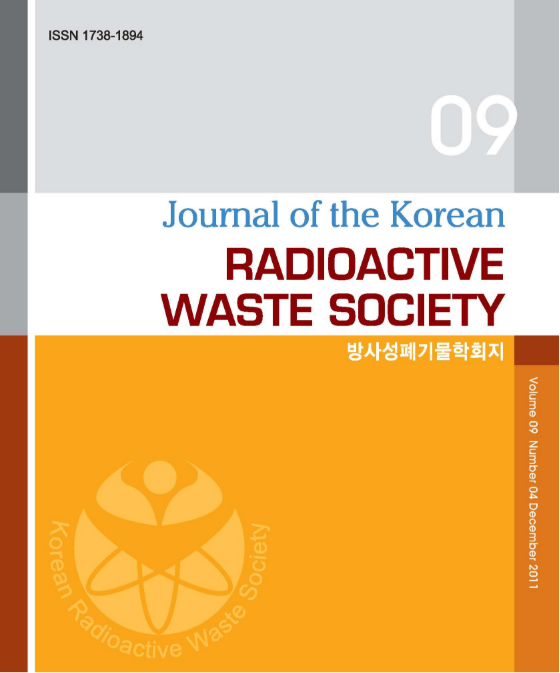학술논문
분광학을 이용한 흄산의 모델 리간드인 2,6-Dihydroxybenzoic acid와 우라늄(VI)의 착물형성 반응에 관한 연구
이용수 0
- 영문명
- Spectroscopic Studies on U(VI) Complex with 2,6-Dihydroxybenzoic acid as a Model Ligand of Humic Acid
- 발행기관
- 한국방사성폐기물학회
- 저자명
- 차완식 조혜륜 정의창
- 간행물 정보
- 『Journal of Nuclear Fuel Cycle and Waste Technology (JNFCWT)』Vol.9 No.4, 207~217쪽, 전체 11쪽
- 주제분류
- 공학 > 공학일반
- 파일형태
- 발행일자
- 2011.12.31

국문 초록
UV-Vis 분광광도법과 시간분해 레이저 유도 형광분광법(TRLFS)을 이용하여 흄산의 모사 리간드로 사용한 2,6-Dihydroxybenzoate(DHB)와 U(VI)의 착물형성반응을 조사하였다. U(VI)-DHB 착물 고유의 전 하이동 흡수 스펙트럼을 분석한 결과, 착물형성반응은 우라늄-리간드 비가 1:1 또는 1:2 착물을 형성하는 이중 평형반응이며, 산도에 따라 착물종의 분포가 변한다는 것을 밝혔다. 계산된 착물형성상수 (log K1 and log K2)는 12.4±0.1과 11.4±0.1이다. 이에 더하여, TRLFS 방법으로 조사한 결과, DHB는 U(VI) 화학종들의 형광 소광제(quencher)로서 역할을 한다는 것을 확인하였다. 특히, 확인된 U(VI) 화학종 모두 (UO22+, (UO2)2(OH)22+과 (UO2)3(OH)5+)에서 정적 (static) 및 동적 (dynamic) 소광작용이 공존하는 것으로 관찰되었다. 시간분해 형광 스펙트럼으로부터 리간드 농도에 따른 U(VI) 화학종의 형광세기와 형광수 명을 측정하였으며, Stern-Volmer 식을 이용하여 분석하였다. 결정된 정적소광계수(KS)는 UO22+, (UO2)2(OH)22+ 과 (UO2)3(OH)5+에 대하여 각각 4.2±0.1, 4.3±0.1 과 4.34±0.08이다. Stern-Volmer 식을 이용한 분석 결과, 단일 또는 이중 배위자 구조(mono- and bi-dentate)의 U(VI)-DHB 착물이 모두 정적소광효과에 관여하는 바닥상태 착물임을 확인하였다.
영문 초록
In this study the complex formation reactions between uranium(VI) and 2,6-dihydroxybenzoate (DHB) as a model ligand of humic acid were investigated by using UV-Vis spectrophotometry and time-resolved laser-induced fluorescence spectroscopy (TRLFS). The analysis of the spectrophotometric data, i.e., absorbance changes at the characteristic charge-transfer bands of the U(VI)-DHB complex, indicates that both 1:1 and 1:2 (U(VI):DHB) complexes occur as a result of dual equilibria and their distribution varies in a pH-dependent manner. The stepwise stability constants determined (log K1 and log K2) are 12.4 0.1 and 11.4 0.1. Further, the TRLFS study shows that DHB plays a role as a fluorescence quencher of U(VI) species. The presence of both a dynamic and static quenching process was identified for all U(VI) species examined, i.e., UO22+, (UO2)2(OH)22+, and (UO2)3(OH)5+. The fluorescence intensity and lifetimes of each species were measured from the time-resolved spectra at various ligand concentrations, and then analyzed based on Stern-Volmer equations. The static quenching constants (log Ks) obtained are 4.2 0.1, 4.3 0.1, and 4.34 0.08 for UO22+, (UO2)2(OH)22+, and (UO2)3(OH)5+, respectively. The results of Stern-Volmer analysis suggest that both mono- and bi-dentate U(VI)-DHB complexes serve as groundstate complexes inducing static quenching.
목차
키워드
해당간행물 수록 논문
참고문헌
최근 이용한 논문
교보eBook 첫 방문을 환영 합니다!

신규가입 혜택 지급이 완료 되었습니다.
바로 사용 가능한 교보e캐시 1,000원 (유효기간 7일)
지금 바로 교보eBook의 다양한 콘텐츠를 이용해 보세요!


